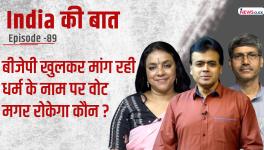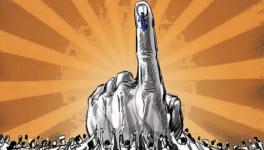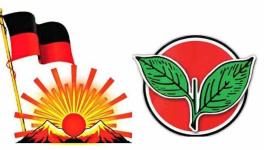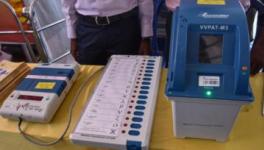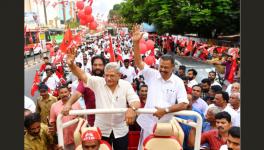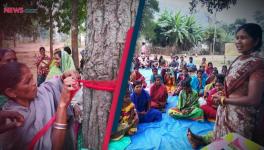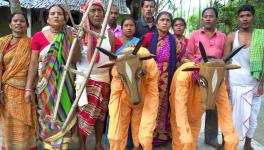Jammu-Kashmir: When ‘Free Kashmir’ Becomes a Crime
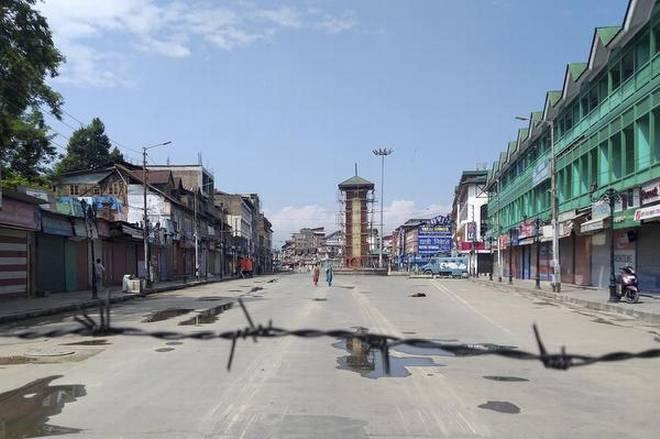
Just two simple words, “Free Kashmir”, on a poster, one amongst hundreds, at a rally in Mumbai on January 5, against the CAA-NRC-NPR triad sent some pseudo-nationalist leaders into paroxysms of rage for being “anti-India”. Mumbai Police were quick to file a FIR under Section 153(B) of IPC for “imputations or assertions prejudicial to national interest”. It is not the 1.3 billion Indians who have gone crazy, it is that ruling and former potentates are scared of evocative forms of expression. Ironically, in the hysteria over a poster, there is plenty of imputation and distortion.
Missed Opportunity
We live in interesting times, obviously. In keeping with them, the Supreme Court read out a judgment on January 10, which it had reserved since November 27, 2019. Meanwhile, Kashmiris remained ‘citizens in chains’, deprived of constitutional freedoms and with no remedy in sight. While the apex court spoke of striking “a balance between liberty and security”, when it came to the crunch, it pushed the “balance” in favour of the executive and security. So, the apex court said that the internet is covered by freedom of expression, but it did not restore the right to access it. Rather, it asked the very same executive, which had curtailed constitutional freedoms, to periodically “review” its own orders and decide whether “there exists a clear and present danger in restricting such expression”.
Also, the court pointedly asked the executive to lay down “temporary” means and spell out the maximum duration of a shutdown under the Temporary Suspension of Telecom Services (Public Emergency or Public Services) Rules 2017. So, relief will be available, if at all, in future, once these orders are made public.
In other words, it is good that the Supreme Court reiterated that internet access is a right, but it has failed citizens by passing the buck to the government of India to unlock it. The Centre, led by a “strong leader”, has withheld the suspension orders from the Supreme Court. All the court could get was “sample orders”. This suggests that the government does not fear the courts anymore. At best, the courts can rap them on the knuckles. What makes this even more evident is the uncritical acceptance of the government’s submission about “terrorism” in Kashmir:
“In this light, we may note the State’s submission that since 1990 to 2019 there have been 3271,038 recorded incidents of terrorist violence, 14,038 civilians have died, 5292 security personnel were martyred, 22,536 terrorists were killed. The geopolitical struggle cannot be played down or ignored.”
These figures, when unpacked, reveal a different story than the one propounded by the State. Because collapsing everything under the category of “terrorist violence” glosses over actual reality. It also puts the onus on “terrorists” when deaths and other acts could have been due to the security forces’ role, or even carried out by militants working for the government.
In light of the enforced disappearances of 8,000 to 10,000 persons since 1990, the death toll of civilians and militants are not all on account of “terrorists”. Worse, bland data ignores the ground conditions where militancy has been contained when compared to thousands of militants, and thousands of so-called militancy-related incidents, and infiltration by the thousands, up to 2001-02, when it peaked. Thereafter, such incidents reduced to lower numbers now, which are considered far below the threshold which security forces themselves regard as threatening.
Unfortunately, going by the kind of relief provided—or actually not provided—to the beleaguered people of Kashmir, the judiciary has once again failed citizens who live in the country’s “disturbed areas”. Neither the J&K High Court nor the apex court showed any alarm over the complete shutdown in Kashmir, the restrictions on all constitutional freedoms, the arrest and detention of hundreds and the postponed Habeas Corpus petition hearings for several months. All this and more was inflicted on citizens, but there was nowhere a captive citizenry could turn to for redress.
In fact, despite evidence of illegal detentions of hundreds of children, of which there are children’s own accounts of torture in custody, the apex court was dismissive of petitioners and accepted the police report, because it had been vetted by a High Court judge. And “in good faith” a certificate was extended to the government and its personnel, in sharp contrast to the court’s scepticism towards ordinary citizen-petitioners. The court also did not find any reason to believe that press freedom has been suppressed and that there is censorship in place. This in the face of one of the most outrageous attacks on media in Kashmir who were called anti-national, their movements restricted and their stories vetted and advertisements to media were withheld, all to force them to kowtow to authorities.
Kashmir, from the judgment, appears to be caught between two narratives; what the State does (turning an entire people captive) with what unarmed people are unable to do (exercise their constitutional freedoms), or State armed with soldiers and law with its phenomenal capacity to injure and cause harm—versus the vulnerability of unarmed citizens—is a sad commentary on the state of the institutions we rely upon to uphold and protect civil liberties.
In other words, our hope and expectation that the judiciary will uphold the rights of citizens are getting dashed again and again. Now, 163 days have passed since the lockdown in Kashmir and it is nowhere close to being lifted. Until then, Kashmir remains “calm” but not “normal”. All that can be said with any degree of certainty is that having been silenced Kashmiris have to wait for their turn to speak. Paradropped politicians in cahoots with the administration do not represent anyone but themselves. And those being groomed as ‘leaders’, fear living amongst their own people.
Taking Envoys for a Jaunt
It is against this background that the visit of foreign envoys from 15 ‘friendly countries’, with a US diplomat in the lead, is interesting. That the Bhartiya Janata Party government distrusts every Indian barring their own ‘fellow travellers’ is now evident to most Indians. But what makes it more explicit is that by first inviting select envoys (after the official tour of Right wing members of the European Parliament) the government sent out a signal that they have much to hide from their own people about actual conditions on the ground.
In any case, if the BJP really was a “nationalist” party then they would have first invited a delegation of Indian parliamentarians, their own fellow citizens, to visit Kashmir. This would have helped dispel much confusion that prevails in India over the ground conditions in J&K, because corporate media’s coverage is a bundle of lies. Besides, India’s erudite foreign minister never tires of claiming that Kashmir is India’s internal affair and that his government is not concerned too much about what others have to say. Yet, it is a US-led envoy’s delegation that was taken for a two-day visit, one day each for Kashmir and Jammu. Going by reports, these “friendly” envoys met “delegations” that had been arranged by an alien administration and cleared by a paranoid security apparatus.
It is doubtful this will do much good for the BJP government, which considers Right wing Republicans “moderates” and critics of India amongst democratic parties as “ultra-Leftists”. The Indian government’s love for the Donald Trump administration did not fetch them any headlines in the US.
Interestingly, this team of envoys did not include any member from the European Union, nor Russia. While EU’s refusal was couched in the garb of difficulties in taking envoys from 28 EU countries, the real reason was the EU’s insistence on meeting people “unescorted”, which the BJP government is scared of. But why Russia was dropped was never explained.
So, those who read something positive in either the apex court’s judgment or the visit of diplomats to Kashmir, should think twice. While hopes were getting raised and dashed, the Ministry of Home Affairs was doing its own bit to ensure that what the ruling BJP has in store for Kashmir does not get diluted. Amidst rising demand for protection of land and jobs for local people in J&K, with a pitch for domicile status as well, the MHA is sending signals that while some protection would be extended, it would be far less than the protection enjoyed by people even in Himachal Pradesh and Uttarakhand. Because only agricultural land would be protected in Kashmir, not any other land or property.
An unnamed MHA “official” has told the Indian Express as much: “Putting too many restrictions on land acquisition will defeat the very purpose of abrogation of Article 370 and the objective of industrialisation and development. Also, with outsiders being allowed to buy land, it will only push up prices and benefit the local people”.
So, the objective of cajoling, luring, coercing people to part with their land in Kashmir persists and is in line with the advertisements and leaflets distributed by the state administration and the Indian Army respectively, a few months back.
Interestingly, MHA has also refused to concede the demand for Sixth Schedule status for Ladakh. And Ladakh, as a directly-ruled virtual colony of India, does not have any provision of an Assembly, either. Whereas the downgraded J&K Assembly will neither have control over any matter to do with land or police. So, while jingoists gloat and remain trapped in their echo chambers, they should fear people’s silence. Because silence hides anger, biding its time.
So much has changed in 163 days, and now a new lot of malleable politicians are being groomed by the agencies and corporate media. Significantly, they are all from amongst the so-called ‘discredited’ lot of pro-India Kashmiri politicians. So, while Mehbooba and the Abdullahs are vilified, for reasons right and wrong, the Altaf Bukharis and Muzaffar Baigs, amongst others are, part of the same discredited lot of politicians which India’s corporate media derides, and they are being promoted.
While leaders and activists from the separatist parties are rotting in jail across North India and kept in most miserable conditions, other pro-Indian politicians remain incarcerated in Kashmir to make them either join the BJP bandwagon or retire from politics. Rumours are afloat that the Abdullahs may be forced to go into exile in London while Mehbooba Mufti still remains a persona non grata.
In short, the Indian state is engaged in a long drawn out conflict where there is no middle ground left. In any case, there is no halfway house between captivity and freedom. Look at the choice facing Kashmiris. Not only have they lost, as others in Jammu and Ladakh, protection of law for their ownership and inviolability of possession of their own land and property. But unlike J&K, Kashmir is a 60 by 40-mile Valley with eight million inhabitants and a huge military deployment of several lakhs, manned by an unrepresentative administration and commanded by largely non-J&K officers. A special status state has been reduced to a Union Territory, which has no power over its land policy or the police. A new “leadership” has been foisted on them yet again, as in the past, this time on a captive people.
The game of deception carries on which is targeted at Indians to keep them fooled. An all-round effort by the J&K administration, security forces and ‘pracharaks’ hell-bent on propping up the BJP in key positions. To think that those serving the BJP are serving the “nation”, better think again. Because the “nation” is split down the middle and the BJP no longer has a monopoly on the “national” discourse. A nation split is a nation divided over fundamental issues. Therefore, for citizenship, Constitution and ‘Azaadi’ to have meaning, our solidarity must extend to Kashmiris and the diabolic plans of the BJP for Kashmir must be exposed.
Nineteen-year-old Mehak Mirza Prabhu simply wanted freedom from the lockdown imposed on Kashmir. Millions of Indians want that too for Kashmiris. It is mainly the bigots and jingoists who relish turning all of Kashmir into a prison and preventing others from saying what they feel. In this sense, paradoxically, her poster on “Free Kashmir” has the possibility of becoming a popular call for freeing Kashmiris from captivity and supporting their right to express their will democratically, just as we have the right to express ours.
So, here is an opportunity which beckons Indians to reach out in solidarity. If we do not believe in ‘othering’ ,then one way to affirm this is by making Kashmir part of our own narrative. So yes, ‘Free Kashmir.’ I read it my way. Let others infuse meaning all their own. It is by reaching out and speaking out for fellow citizens who have been silenced that we build understanding and compassion, and counter the process of ‘othering’. Freedom is indivisible. We cannot be free if fellow citizens in some part of the country are kept captive.
The writer is a civil rights activist. The views are personal.
Get the latest reports & analysis with people's perspective on Protests, movements & deep analytical videos, discussions of the current affairs in your Telegram app. Subscribe to NewsClick's Telegram channel & get Real-Time updates on stories, as they get published on our website.









